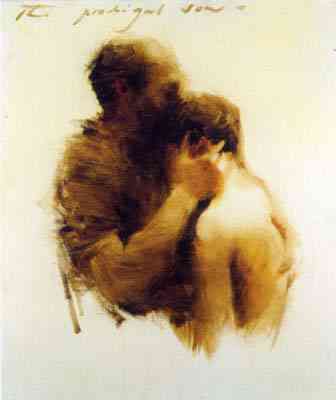Gutsy Embrace

I’m not a big fan of “inclusion.” I’m very much for widening the circle of love and embrace, but “inclusion” has been sloganized by liberal Protestants until it means something like vague acceptance. The ideal includers are people with a coat hanger smile who just love everybody! And if that’s what it takes to be “inclusive” most of us know that can’t be us. We don’t love everyone. We don’t even like everyone. We don’t agree with everyone and we care too much about what we believe is right to pretend that it doesn’t matter.
That model of “inclusion,” however, is a bogus version of the real thing, based on a cardboard cut out of God.
God chooses everybody! God includes everybody! That sounds vaguely virtuous–as if it were something God does with ease. After all, God is love. It must be a cinch for the Almighty.
Actually, if you read the Bible you know different. The Bible shows us how God struggles with certain people, how God gets annoyed with people, has it up to here with some people, gets angry in fact with certain people. Famously, God says, “Jacob have I loved and Esau have I hated” (Malachi 1:3). That’s how God really feels, and the Hebrews were never shy about including prohibited emotions and feelings in sacred scripture.
The powerful thing is–this is the God who chooses everyone. God chooses the ones he likes and the ones he doesn’t like. He chooses Jacob, and he chooses Esau too. If you forgot that part of the story, just read Genesis chapter 37, where God blesses Esau’s son, Ishmael and says of him the same thing he says of Jacob: “I will make of you a great nation.”
God chooses everyone—everyone. Not because he’s a sentimental sort of guy who just loves everybody and doesn’t really have a strong opinion about anything or anybody. God as bleeding heart. “A liberal,” quipped Robert Frost, “is a man too broadminded to take his own side in a quarrel.” That’s not God. God is intense, is powerfully invested in the life of the world, is delighted when people are faithful and compassionate and fully alive…but is angry with injustice and cruelty and wrong. And yet this is the God who chooses everyone. Even the ones who stray, who challenge the divine will, who follow their own devices and desires.
That is not a namby pamby inclusion; it is a fierce embrace. That is the model we need to emulate if we are going to widen our circle of love. Otherwise we will only be singing kumbaya. To love as God loves we must be honest about how fiercely we reject certain people–those closest to us and those we ritually hate on Face Book–so that we can bring that same fierceness into our embrace. Not, “I used to despise you, but now you’re my BFF so you’re in my circle of inclusion,” but “I still think you’re miserably wrong and misguided and you still make me cringe, but if you think you are going to escape my circle of inclusion, buddy, you’ve got another thing coming.”

Interesting. Maybe I missed it, but what is your definition of inclusion? Always love your writing whether I agree or not.
I think you’re saying thatinclusion doesn’t engage the will. It’s an act of emotion only, and only of positive emotion and therefore involves no sacrifice.
Whereas God’s choosing involves both justice and love. God loves us and he loves justice. He chooses us AND commands us to live in alignment with his righteousness.
Thank you for confronting how unsettling it can be to “love our neighbor”. You have unmasked a difficult truth. With the divisions we feel so passionately I need to sit with these paradoxes and endeavor to apply them, with God’s help.